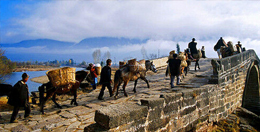Prosperous Ethnic Communities Promote Unity in Kunming
The development of various ethnic communities in Kunming, capital city of China's Southwestern Yunnan province, has tremendously strengthened the unity and harmonious co-existence of ethnic groups.
Kunming is home to 52 ethnic groups, including Yi, Hui, Dai, Bai, Miao and so on. The population of ethnic groups has reached 856,200, accounting for 15.55% of the total of the city. Communities are the main places that help people of various ethnic groups improve living conditions and pursue happiness.
Shuncheng Community, located in an urban area, is a typical ethnic community of Kunming. The 10597 residents are from 15 ethnic groups, among which 2990 are of minorities like Hui, Yi, Bai and so on.
Luo Xiao, a Hui official of the community, highlights the humanistic service and help provided by the community to residents of all the ethnic groups.
"86-year-old Ma Bingliang is a senior resident of the Hui ethnic group who lives alone. Some time ago, his neighbor reported that the old man has not showed up for three days. Workers of the community went to his home and found that he had been ill for some time. The workers sent Ma to hospital and took care of him until he recovered," Luo said. And this is only one of the many stories about the community's work.
The community also uses digital measures to provide more conveniences to residents. Luo said the Wechat service account of the community which came online in this June has already attracted more than 400 users. The account releases information that residents can use in daily life.
Luo also explained that the religious faith of ethnic groups are respected in the community. There is a historic mosque in the central area in Shuncheng Community, where Muslims can conduct religious activities.
Dai Junfeng, the head of the Kunming Islamic Association, said that the mosques in Kunming have forged close links with the community. On one hand, the communities make full use of mosques to promote the satisfaction of people from Hui ethnic group and on the other hand, mosques rely on communities' services and help to develop. "The mosque has integrated into the life of the communities and is not mysterious anymore."
Jinxing ethnic community, which has a lot in common with Shuncheng Community, holds various training courses for residents of the various ethnic groups. Through the training, many of them can get job offers and increase their income.
Jinxing community is home to 28 minor ethnic groups including Hui, Miao, Yi and so on. Peng Xiaoli, 33, is from the Dai ethnic group and has been living in Jinxing community since 2012. "After I came to this community, I learned the art of tea-making in the training courses organized by the community and now I am a tea art specialist, " she said.
Peng is not the only one who has benefitted from the career training courses. According to Su Qiongfen, the secretary of the Party committee of Jingxing community, there are all together 324 residents who have participated in the training courses which help them get jobs.
Unlike communities in the city, the ones in suburban areas have more recourses to develop tourism. Doupo community is home to 1445 residents, among whom 39.5% are from the Bai ethnic group. The community has been tapping its potential to develop into a tourist attraction, depending on its traditional Bai ethnic cultural features.
Yan Xianyan, 30, a member of the community, has a decent job in the city of Kunming as a worker of digital city management. She is considering opening a rural home inn in her home town due to the fast development of tourism in her hometown, which has brought it more tourists and opportunities.
Yan said that the development of the community also brings happiness to her own family. "If I realize my dream to run a rural home inn in my hometown, I will be able to take care of my parents. That I cannot do when I am working in the city."














